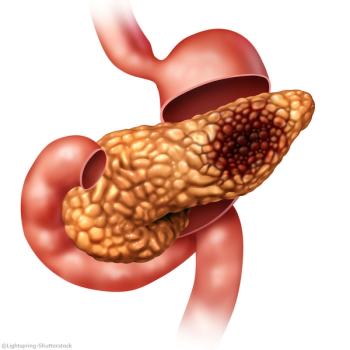
Oncology NEWS International
- Oncology NEWS International Vol 17 No 9
- Volume 17
- Issue 9
Adjuvant gemcitabine improves outcomes of pancreatic ca
CHICAGO-Compared with observation, adjuvant gemcitabine (Gemzar) reduces the risk of recurrence by 45% and the risk of death by 28% in patients with resected pancreatic cancer, according to final results of the CONKO-001 trial.
ABSTRACT: Final results of the CONKO-001 trial show significant gains in both disease-free survival and overall survival with this chemotherapy.
CHICAGO-Compared with observation, adjuvant gemcitabine (Gemzar) reduces the risk of
recurrence by 45% and the risk of death by 28% in patients with resected pancreatic cancer, according to final results of the CONKO-001 trial.
In the phase III trial, patients who had undergone a complete resection of pancreatic cancer were randomized to adjuvant gemcitabine or observation. The final analysis, which had a cutoff of March 2008, was based on 179 patients in the gemcitabine group and 175 patients in the observation group. Lead investigator Ulf P. Neumann, MD, PhD, of the Charit School of Medicine in Berlin noted that the majority of patients had T3 or T4 tumors (86%) and node-positive disease (72%).
Benefits
Median disease-free survival, previously reported last year (Oettle H et al: JAMA 297:267-277, 2007), remained significantly longer in the gemcitabine group relative to the observation group in the final analysis (13.4 vs 6.9 months), with a significant 45% reduction in the risk of recurrence (hazard ratio, 0.55).
Moreover, this benefit was also significant in subgroups of patients stratified by resection type (R0 vs R1), nodal status (positive vs negative), and T stage (T 1/2 vs T 3/4).
Median overall survival, which did not differ by treatment in the earlier analysis, was now significantly longer with gemcitabine (22.8 vs 20.2 months), with a significant 28% reduction in the risk of death (hazard ratio, 0.72).
“The curves for the observation arm and the treatment arm separate about 2 years after the operation,” Dr. Neumann noted during his talk at ASCO 2008 (abstract 4504).
The absolute survival advantage of gemcitabine increased with time and resulted in long-term survival for about one-fifth of patients (see Table).
“Adjuvant treatment with gemcitabine doubles the long-term survival rate after 5 years compared with observation,” he pointed out.
Analyses of this outcome in subgroups, which Dr. Neumann cautioned were too small to produce definitive conclusions, suggested that gemcitabine conferred a significant survival benefit relative to observation after R0 resection (22.8 vs 20.3 months) and a trend toward one after R1 resection (22.1 vs 14.1 months).
Also, there was a trend toward better survival among patients with T1 or T2 tumors (40.6 vs 27.0 months) as well as significantly better survival among those with T3 or T4 tumors (21.0 vs 19.0 months).
Summing up the findings, Dr. Neumann asserted that treatment with gemcitabine improves both disease-free and overall survival in this population.
“Gemcitabine should be the standard of care for adjuvant treatment of pancreatic cancer,” he concluded.
Articles in this issue
over 17 years ago
Japanese team discovers more cancer falloutover 17 years ago
Panel pans FDG-PET for new Medicare oncology coverageover 17 years ago
Sen. Kennedy's brain tumor puts spotlight on new treatmentover 17 years ago
Precise resection in colon cancer may boost survivalover 17 years ago
Payer’s budget to get right targeted drug to right patientover 17 years ago
PET brings treatment changes in majority of colon ca casesover 17 years ago
High death rate brings prostate ca vaccine trial to a haltover 17 years ago
Radiofrequency ablation eliminates nondysplastic BEover 17 years ago
Childhood cancer research gets $30 million from fedsNewsletter
Stay up to date on recent advances in the multidisciplinary approach to cancer.




































